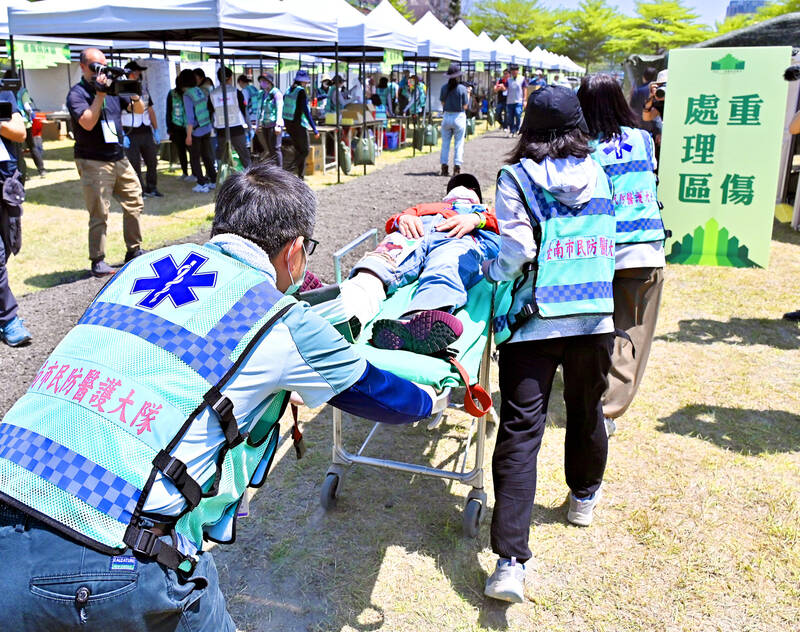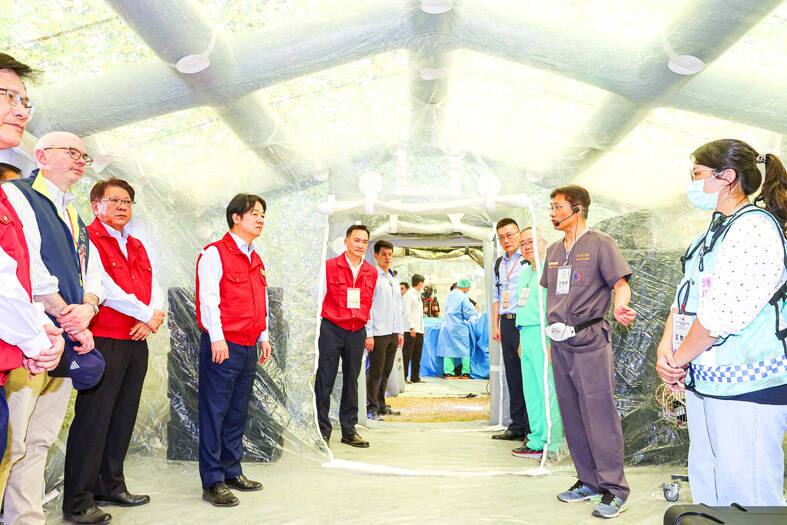President William Lai (賴清德) yesterday oversaw the first civil defense drills under his newly created social resilience committee simulating how to respond to a large-scale disaster such as a tsunami or attacks on critical infrastructure.
The drill in Tainan was held under the auspices of Lai’s new Whole-of-Society Defense Resilience Committee, set up last year to prepare to deal with natural disasters or other emergencies such as an attack by China.
Speaking to participants after viewing some of the drills, Lai said these were the first live drills for the committee and involved about 1,500 people, adding that there would be more next month.

Photo: Tu Chien-jung, Taipei Times
“The aim is to build the resilience of Taiwanese society to cope with large natural disasters or major accidents that cause a lot of injuries, or regional geopolitical changes. We dare not fail to prepare,” he added.
“As the saying goes, prevention is better than cure and we should rely not on the likelihood of the enemy not coming, but on our own readiness to receive him,” Lai said.
“We hope that through strength, not only of the military, but also the resilience of the entire society in defense, we can ensure Taiwan’s security and ensure that peace can be achieved through the demonstration of our strength,” he added.

Photo: CNA
Shortly after Lai spoke, the Ministry of National Defense said China yesterday held another “joint combat readiness patrol” around the nation with 28 fighter jets, drones and other aircraft, as well as warships.
The Tainan drills simulated scenarios such as a tsunami after a massive offshore earthquake and “explosions” at a passenger port terminal, evacuating casualties to triage centers and setting up emergency response command posts.
The drill was carried out based on a scenario in which an explosion occurred near the tourist service center at Anping Port (安平港), with an estimated 200 casualties at the scene.
Under tents, casualties were laid out on the ground and treated, as other officials used large whiteboards to keep track of their care and who had died or the level of injuries.
About 1,500 people were mobilized — including police officers, a special team from Anping Harbor, volunteers organized by local police stations and fire departments, and members of charity groups and businesses — to work alongside alternative service conscripts in the operation.
While the military, which is at the front lines of helping deal with actual disasters such as earthquakes, was not directly involved, the armed forces did lend equipment to set up outside operating theaters and other medical equipment.
Also in attendance and observing the drills were Vice President Hsiao Bi-khim (蕭美琴) and representatives from 13 governments, including the US, EU, Polish, Finnish and Indian representatives to Taiwan, among other senior foreign diplomats from the UK, Singapore, Japan, Israel, Canada and Australia.
American Institute in Taiwan Director Raymond Greene praised the performance in a statement.
“I was impressed to see community members, first responders, city officials and Taiwan’s central authorities unite and demonstrate the resolve and strength of the people in Taiwan to face future challenges,” he said.
Additional reporting by Kayleigh Madjar and CNA

Seventy percent of middle and elementary schools now conduct English classes entirely in English, the Ministry of Education said, as it encourages schools nationwide to adopt this practice Minister of Education (MOE) Cheng Ying-yao (鄭英耀) is scheduled to present a report on the government’s bilingual education policy to the Legislative Yuan’s Education and Culture Committee today. The report would outline strategies aimed at expanding access to education, reducing regional disparities and improving talent cultivation. Implementation of bilingual education policies has varied across local governments, occasionally drawing public criticism. For example, some schools have required teachers of non-English subjects to pass English proficiency

‘FORM OF PROTEST’: The German Institute Taipei said it was ‘shocked’ to see Nazi symbolism used in connection with political aims as it condemned the incident Sung Chien-liang (宋建樑), who led efforts to recall Democratic Progressive Party (DPP) Legislator Lee Kun-cheng (李坤城), was released on bail of NT$80,000 yesterday amid an outcry over a Nazi armband he wore to questioning the night before. Sung arrived at the New Taipei City District Prosecutors’ Office for questioning in a recall petition forgery case on Tuesday night wearing a red armband bearing a swastika, carrying a copy of Adolf Hitler’s Mein Kampf and giving a Nazi salute. Sung left the building at 1:15am without the armband and apparently covering the book with a coat. This is a serious international scandal and Chinese

TRADE: The premier pledged safeguards on ‘Made in Taiwan’ labeling, anti-dumping measures and stricter export controls to strengthen its position in trade talks Products labeled “made in Taiwan” must be genuinely made in Taiwan, Premier Cho Jung-tai (卓榮泰) said yesterday, vowing to enforce strict safeguards against “origin laundering” and initiate anti-dumping investigations to prevent China dumping its products in Taiwan. Cho made the remarks in a discussion session with representatives from industries in Kaohsiung. In response to the US government’s recent announcement of “reciprocal” tariffs on its trading partners, President William Lai (賴清德) and Cho last week began a series of consultations with industry leaders nationwide to gather feedback and address concerns. Taiwanese and US officials held a videoconference on Friday evening to discuss the

PERSONAL DATA: The implicated KMT members allegedly compiled their petitions by copying names from party lists without the consent of the people concerned Judicial authorities searched six locations yesterday and questioned six people, including one elderly Chinese Nationalist Party (KMT) member and five KMT Youth League associates, about alleged signature forgery and fraud relating to their recall efforts against two Democratic Progressive Party (DPP) legislators. After launching a probe into alleged signature forgery and related fraud in the KMT’s recall effort, prosecutors received a number of complaints, including about one petition that had 1,748 signatures of voters whose family members said they had already passed away, and also voters who said they did not approve the use of their name, Taipei Deputy Chief Prosecutor